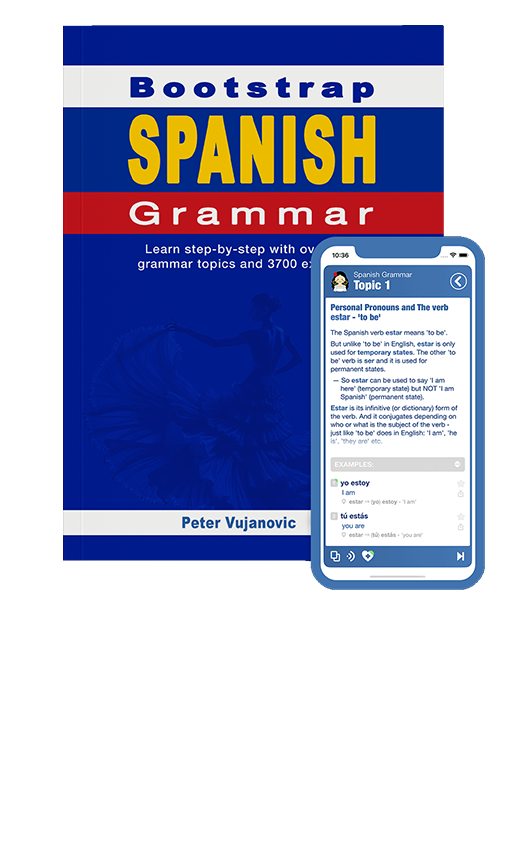Spanish grammar - Would have' - El condicional perfecto |
|||
|
|||
The condicional perfecto is used to express what would have taken place in the past had some other action, event, or situation happened. For past hypotheticals, the pattern is si + pluscuamperfecto de subjuntivo & condicional perfecto. The equivalent in English is, for example: 'if he had done that, I would have done this.' The condicional perfecto is formed by using the conditional of the auxiliary verb haber + [past participle]: • yo : haber ⇒ habría • tú : haber ⇒ habrías • él, ella, usted : haber ⇒ habría • nosotros : haber ⇒ habríamos • vosotros : haber ⇒ habríais • ellos, ellas, ustedes : haber ⇒ habrían The condicional perfecto follows the same rules of agreement as all compound tenses that use the past participle, such as el pretérito perfecto compuesto. |
| Examples: | |
|
Habría salido si no hubiera estado lloviendo.
(I) would have gone out if it hadn't been raining.
|
|
|
Si hubiera sabido que iba a llover, habría llevado mi paraguas.
If (I) had known it was going to rain, (I) would have taken my umbrella.
|
|
|
Habría terminado mi tarea si me hubieran dejado en paz.
(I) would have finished my homework if they had left me alone.
|
|
|
Si hubiera sabido la hora de su llegada, habría ido a buscarlo.
If (I) had known the time of his arrival, (I) would have gone to look for him.
|
|
|
Si no hubieras seguido nuestro consejo, ¿qué habría pasado?
If (you, familiar) hadn't taken our advice, what would have happened?
|
|
|
Se habrían quedado en Francia si hubieran podido.
(They) would have stayed in France if they could.
|
|
|
Si no hubieras despertado a las niñas, habrían dormido hasta el mediodía.
If (you, familiar) hadn't woken the girls, they would have slept until noon.
|
|
|
Juliette habría llegado a tiempo, pero su coche se había averiado.
Juliette would have arrived on time, but her car had broken down.
|
|
|
Se habría despertado temprano, pero su despertador no funcionó.
(She) would have woken up early, but her alarm clock didn't work.
|
|
|
Incluso con más tiempo, nunca habría terminado la tarea.
Even with more time, (he) would never have finished the task.
|
|
|
No habría bailado más porque tenía dolor de cabeza.
(I) wouldn't have danced anymore because (I) had a headache.
|
|
|
Me habría encantado ir a Argentina.
(I) would have loved to go to Argentina.
|
|
|
Juan podría haber sido un gran artista.
Juan could have been a great artist.
|
|
|
Habría escrito una carta si hubiera tenido tiempo.
(I) would have written a letter if (I) had had time.
|
|
|
Ellos habrían ganado el partido si hubieran practicado más.
(They) would have won the game if they had practiced more.
|
|
|
Si no hubieras llegado tarde, habríamos comenzado a tiempo.
If (you, familiar) hadn't arrived late, (we) would have started on time.
|
|
|
Habría comprado el coche si hubiera tenido suficiente dinero.
(I) would have bought the car if (I) had had enough money.
|
|
|
Ella habría cocinado la cena si no hubiera estado tan cansada.
(She) would have cooked dinner if she hadn't been so tired.
|
|
|
Habríamos ido a la playa si el tiempo hubiera estado mejor.
(We) would have gone to the beach if the weather had been better.
|
|
|
Me habrías llamado si hubieras sabido la verdad.
(You, familiar) would have called me if (you) had known the truth.
|
|
 |
|




